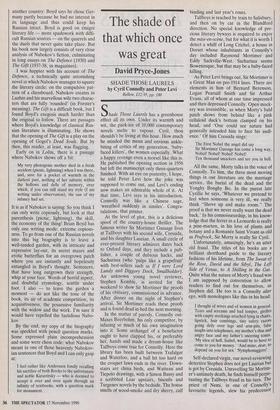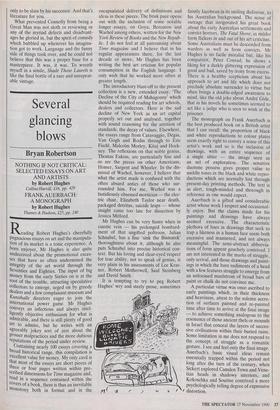The shade of that which once was great
David Pryce-Jones
SHADE THOSE LAURELS by Cyril Connolly and Peter Levi
Bellew, £12.95, pp. 180
Shade Those Laurels has a greenhouse effect all its own. Under its warmth and wit, the pack-ice of 10,000 contemporary novels melts to vapour. Cyril, thou shoulds't be living at this hour. How much he minded the mean and envious ankle- biting of critics of my generation, 'baby- faced killers', the women especially. What a happy revenge even a morsel like this is. He published the opening section in 1956 but left the manuscript only three-quarters finished. With an eye on posterity, I hope, he told Peter Levi how the joke was supposed to come out, and Levi's ending now makes an admirable whole of it. At that time, Levi says in his introduction, Connolly was like a Chinese sage, `wreathed suddenly in similes'. Congra- tulations, that printer.
At the level of plot, this is a delicious spoof of the country-house thriller. The famous writer Sir Mortimer Gussage lives at Tallboys with his second wife, Cressida, and his daughter Laurian. A small circle of ever-present literary admirers dates back to Oxford days, and they include a pub- lisher, a couple of dubious hacks, and Sacharissa (who 'pulps like a grapefruit' with best-sellers such as If I were Lord Lundy and Diggory Dock, Smallholder). An unknown young novel reviewer, Stephen Kemble, is invited for the weekend to show Sir Mortimer the proofs of his obituary, commissioned in advance. After dinner on the night of Stephen's arrival, Sir Mortimer reads these proofs and is found dead in bed the next morning.
In the matter of parody, Connolly out- Maxes Beerbohm, his only competitor, by infusing so much of his own imagination into it. Some archangel of a benefactor ought to have clapped his, or preferably her, hands and made a dream-house like Tallboys come true for Connolly. Here the library has been built between Trafalgar and Waterloo, and a ball hit too hard on the croquet lawn ends in the river. Down- stairs are china birds, and Watteau and Tiepolo drawings, with a•Simon Bussy and a scribbled Lear upstairs, biscuits and Turgenev novels by the bedside. The house smells of wood-smoke and dry sherry, calf binding and last year's roses.
Tallboys is reached by train to Salisbury, and then on by car in the Blandford direction. No special knowledge of pre- cious literary byways is required to enjoy the mice-en-scene, but for what it is worth I detect a whiff of Long Crichel, a house in Dorset whose inhabitants in Connolly's day included Raymond Mortimer and Eddy Sackville-West. Sacharissa seems Bowenesque, but that may be a baby-faced killing.
As Peter Levi brings out, Sir Mortimer is a Great Man on pre-1914 lines. There are elements in him of Bernard Berenson, Logan Pearsall Smith and Sir Arthur Evans, all of whom at one time impressed and then depressed Connolly. Open mock- ery was irresistible, as when Morty's bald patch shows from behind like a pink celluloid duck's bottom clamped on his head, and 'One could see nature had generally intended him to face his audi- ence.' Of him Cressida sings:
The First Nobel the angel did say Sir Mortimer Gussage has come a long way, Nobel! Nobel! Nobel! Nobel!
Ten thousand smackers and see you in hell.
All the same, Morty talks in the voice of Connolly. To him, the three most moving things in our literature are the marriage service, the burial of the dead and the Yonghy Bonghy Bo. In the purest late Cyrillic he says, 'Whatever we pretend to feel when someone is very ill, we really think "Shove up and make room." The proof is that we never really want the dead back.' In his connoisseurship, in his know- ledge that the ferret in a Leonardo is really a pine-marten, in his love of plants and botany and a Roman& Saint Vivant as old as Prufrock, Sir Morty is really Sir Cyril.
Unfortunately, amusingly, he's an utter old fraud. The titles of his books are a brilliant shorthand guide to the literary fashions of his lifetime, from The Sweat of the Rose, David and the Sibyl, The Left Side of Venus, to A Shilling in the Gas. Quite what the nature of Morty's fraud was I am supposed by convention to allow readers to find out for themselves, as Stephen did. He too is a Connolly alter ego, with monologues like this in his head: I thought of wives and of women in general. Tears and screams and bad temper, girdles with empty stockings attached lying in chairs, lipstick, hair combings, tiny safety razors going drily over legs and arm-pits, false laughs into telephones, my mother's thin and angry face and my father's sneering tones. `My idea of hell, Isabel, would be to have to come to you for money.' And mine, dear, to depend on you for sex.' Nymphonaggers!
Self-declared virgin, our novel-reviewing detective Stephen does not get Laurian but is got by Cressida. Unravelling Sir Mortim- er's untimely death, he finds himself perpe- tuating the Tallboys fraud in his turn. The priest of Nemi, in one of Connolly's favourite legends, slew his predecessor only to be slain by his successor. And that's literature for you. What prevented Connolly from being a Great Man was not sloth or reviewing or any of the myriad defects and disadvant- ages he gloried in, but the spirit of comedy which bubbled up whenever his imagina- tion got to work. Language and the funny side of things took over, and he could not believe that this was a proper base for a masterpiece. It was, it was. To wreath myself in a simile, Shade Those Laurels is like the final bottle of a rare and unrepeat- able vintage.
























































 Previous page
Previous page